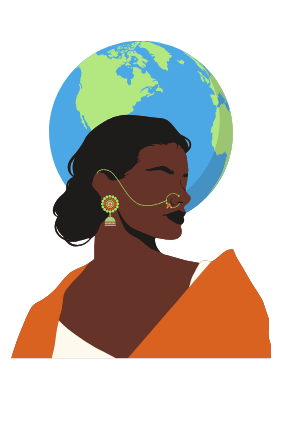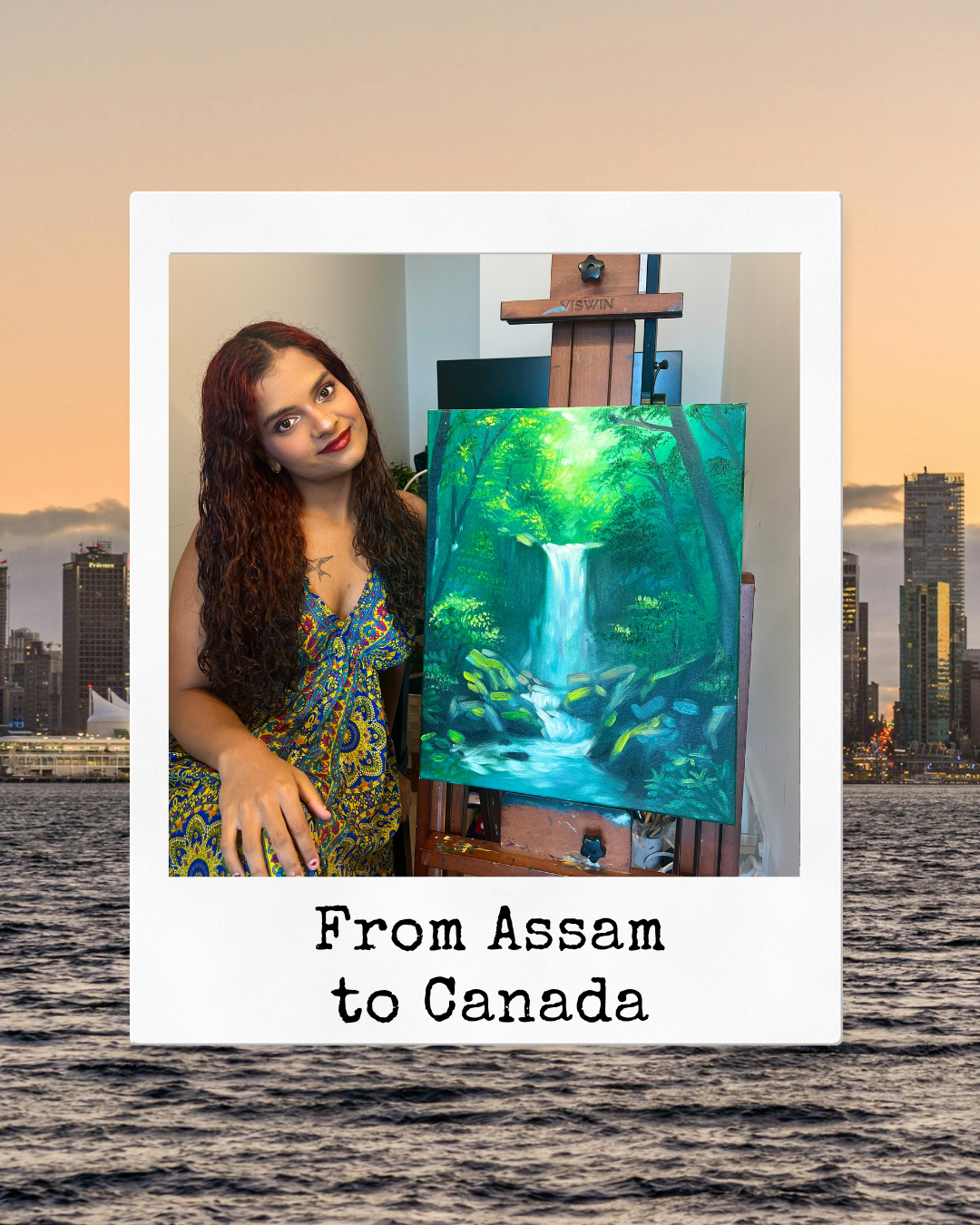When Nilasha Bhimsaria moved from the lush landscapes of Assam to the vibrant city of Vancouver, she carried with her not just a suitcase — but a lifelong love for art. In this interview with Indian Women Abroad, she opens up about navigating culture shock, battling imposter syndrome, and building a creative life from scratch in a foreign land.
From late-night painting sessions to launching her own business, her story is one of quiet resilience and fierce self-expression. This is the journey of an Indian woman abroad, finding freedom and purpose through art.
Where are you from in India, and where did you move?
I’m from a small but vibrant state called Assam, nestled in the northeastern region of India. In 2020, I moved to Vancouver, Canada, to pursue my undergraduate studies.
Why did you move to the country, and what are you doing now?
I moved to Canada to pursue a Bachelor’s in Fine Arts, specialising in Visual Arts, with a particular focus on painting. It’s a four-year program that has been an incredibly enriching experience, both creatively and personally.
What was your experience of moving and adjusting to a new culture like?
Moving to an entirely new country was, unsurprisingly, quite overwhelming at first. Coming from a small town and a boarding school environment, I wasn’t used to big city life. Everything was unfamiliar, the people, the culture, even the pace of life.
But having my sister here was a great support, and Vancouver itself is so welcoming and inclusive. It’s a city where cultures from all over the world intersect, which really helped me feel seen and better understand my
surroundings.
What are the biggest pros of moving? What lessons have you learned?
The biggest pro has definitely been the chance to experience life through a new lens, to truly ‘adult’ in a way I never had to back home. From navigating finances to living independently, I’ve gained a lot of practical life skills.
Academically, my college has pushed me to dream bigger and eliminate the mental boundaries I had around pursuing a career in art. I’ve learned that success in creative fields is possible, and more importantly, that it’s valid.
What are the biggest challenges you have faced?
One of the hardest challenges has been fighting my own self-doubt, that little voice questioning if I can really make it in such an unconventional field. Being in a competitive environment has helped me grow, but it has also at times brought on feelings of imposter syndrome.
Was it easy to adjust to a new environment? How did you find/build a social circle?
Not at all in the beginning. My first semester in the foundation year was really tough; I had spent 10 years with the same group of friends back in school. But things started shifting by the second semester. I found my people mostly through classes, since each one brings together a new group of 15–20 students. These small, rotating groups helped me connect naturally and build
friendships over time.
What role has your art played in your life abroad? Did you start back when you were in India or is it something you picked up in Canada?
Art has always been my emotional outlet. I started painting when I was just 2 or 3 years old, and my parents played a huge role in nurturing my artistic potential early on. Moving abroad hasn’t changed that; it’s only deepened my connection to my practice. My work often reflects my personal journey and cultural roots, and I hope to keep creating for the next 80 years of my life!
What’s the response been like? Could you share your inspirations behind your work and art in general?
The response has been encouraging, though it’s come with its ups and downs. Being surrounded by other creative minds is a blessing, but feedback and critiques can be hard to take sometimes.
Nature is my biggest inspiration; I grew up surrounded by it. My school was in a forest, monkeys would peek into my room, and tea gardens stretched for miles. That connection to nature has never left me. Whether I’m working on a zodiac-themed series or exploring Greek mythology, I always find myself tying it back to the natural world. I’m also grateful to live in a city like
Vancouver, where nature and wildlife are respected and integrated into daily life.
In the context of the experience of Indian women back home, what do you prefer: living abroad or living in India?
This is a tough one and something I often reflect on. Living abroad offers a sense of freedom and safety. I didn’t always feel back home. For instance, I can walk outside at 2am here and not worry, and my parents are comfortable with that because they know I’m in a safe environment. I grew up quite sheltered in boarding school, with limited exposure to the world beyond 9pm. So this level of freedom has been eye-opening. That said, I’m incredibly grateful for the privileged and protected upbringing I had in India, and I value both experiences deeply.
Are there any new freedoms or experiences you’ve had, that you probably didn’t have access to back home?
Absolutely. Living here has made me take charge of my own life in ways I hadn’t before. Starting my small business, earning money, and investing it in myself, whether through travel or my art, have given me a real sense of empowerment. Back home, I naturally relied on my parents for many things. But here, I’ve had to become more independent.
One unique experience has been participating in art sales and markets. These spaces have introduced me to fellow creatives and clients who are deeply invested in art. I’m not sure I would have had the same opportunities in Assam, so I treasure these experiences.
Any advice for other Indian women abroad?
I truly believe that every Indian woman should experience the world as much as she can.
Speaking as someone who knows will eventually return to India, because I love my country and where I come from, I still feel it’s important to embrace the freedoms that living abroad offers. There’s something incredibly powerful about being able to breathe freely, to speak openly about your identity, your culture, your genes, without fear or judgment.
I want every Indian woman to make full use of that liberty, to own it. And to women in general: don’t let the noise or doubts around you break your spirit. Instead, use that self-doubt, those negative emotions, as fuel to push yourself forward. Channel them into your work, your growth, your story. That’s what I’ve tried to do, and it’s made all the difference.



